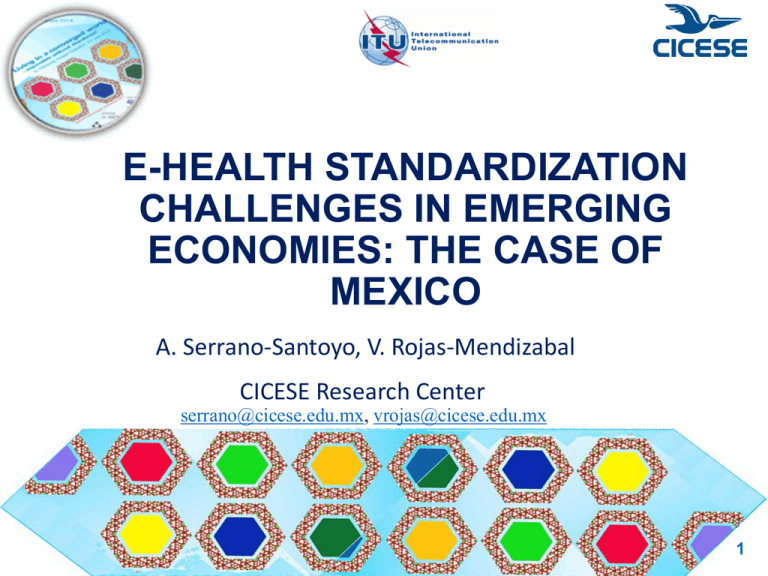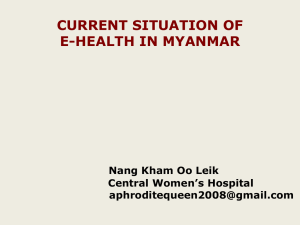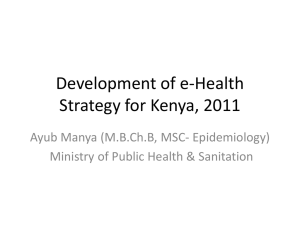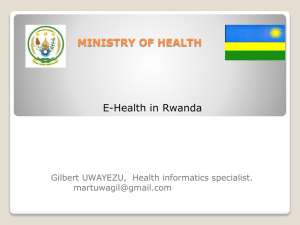E-HEALTH STANDARDIZATION CHALLENGES IN EMERGING ECONOMIES: THE CASE OF MEXICO
advertisement

E-HEALTH STANDARDIZATION CHALLENGES IN EMERGING ECONOMIES: THE CASE OF MEXICO A. Serrano-Santoyo, V. Rojas-Mendizabal CICESE Research Center serrano@cicese.edu.mx, vrojas@cicese.edu.mx 1 Introduction • It is particularly relevant the role of standardization in a complex and highly converging context. Complex Nature Interaction s among all actors Comprehensive framework for e-Health standardization in emerging economies. 2 The Mexican case of e-health standardization • Important efforts from government agencies have been placed to structure strategies and actions to increase the role of ICT in practically all the pieces of the value chain of the national e-Health ecosystem. • The ICT regulatory bodies had acknowledged the importance of standardization to advance the competitiveness indicators of the country and at the same time, the national health institutions recognize the need of standards that include ICT in their medical practices, delivery of services and equipment. 3 The Mexican case of e-health standardization Current governmental and legal structures create a foundation for the development of a comprehensive eHealth standardization framework. The following initiatives are noteworthy: • General Directorate of Quality and Health Education. • National Center for Health Technology Excellence (CENETEC). • Publication of two key regulatory instruments. • Establishment and strengthening of the e-Mexico National System. 4 The Mexican case of e-health standardization A general overview of issues concerning the current status of e-Health standardization is described as follows: • Results of the application of the ITU-TASC tool for assessing standardization capabilities indicate that the country faces major challenges in standardization matters. • The e-Health country profile for Mexico of the WHO Global Observatory for e-Health shows a significant deficit in key indicators, particularly those related to e-Health standardization. 5 Elements of a comprehensive E-Health standardization framework • This framework should consider an interdisciplinary and collaborative approach and that Mexican health and ICT regulatory bodies need to take into account the importance of the development of endemic eHealth standards rather than merely focusing on their use and implementation. • Process of standards creation emerges from the interactions of the four subsystems forming the eHealth ecosystem. 6 Elements of a comprehensive E-Health standardization framework e-Health ecosystem: 7 Elements of a comprehensive E-Health standardization framework 8 Elements of a comprehensive E-Health standardization framework 9 Elements of a comprehensive E-Health standardization framework • We identify three major challenges towards a comprehensive e-Health standardization framework: • The aspect of culture • Capacity Building. • Learning by doing. 1 Recommendations and conclusions • We identify major areas to improve the status of e-Health standardization in emerging economies: • Establish a national e-Health policy emphasizing the crucial role of standardization in the value chain of medical processes and technologies (national plan). • Given the nature and dynamics of the e-Health ecosystem, the legal and ethical aspects of the framework become relevant and must be addressed. • Capacity building and the establishment of a national program to permeate all levels of society are two critical aspects to foster a culture of standardization in the country. 11 Recommendations and conclusions • The e-Health standardization framework should consider the following disciplines: Telemedicine, m-Health, eLearning in health sciences for all the medical specialties, management of patient and medical infrastructure, as well as the legal and ethical elements involved. • It is important to focus on the patients´ needs and interaction with data and technology. Our approach of conceptualizing the e-Health ecosystem as a sociotechnical-legal system would support the development of an integrated and a comprehensive national e-Health plan. • Complexity becomes relevant to understand, and to explain the challenges and needs of a sustainable eHealth framework. 12 Recommendations and conclusions • An integral framework for e-Health standardization can provide a catalyst for moving away from a technology adoption condition toward a technology development model. • Without a comprehensive framework for e-Health in emerging economies, the role of ICT as a vehicle for socioeconomic development will be elusive and an important opportunity to participate in the definition and creation of standards of global impact will be lost. 13 Recommendations and conclusions • The experiences of emerging economies and developing countries in the provision of e-Health services in rural and under-served areas is very important, the development of a national standards framework for e-Health supported by all the regulatory agencies involved is viewed by the authors as a fundamental step in the transit toward the knowledge society. • We finally stress the pertinence of adopting an approach from complexity science, which may contribute to develop an integrated view of the standardization process and to understanding the context and nature and magnitude of the interactions of all the actors involved in the particular national e-Health ecosystem. 14





